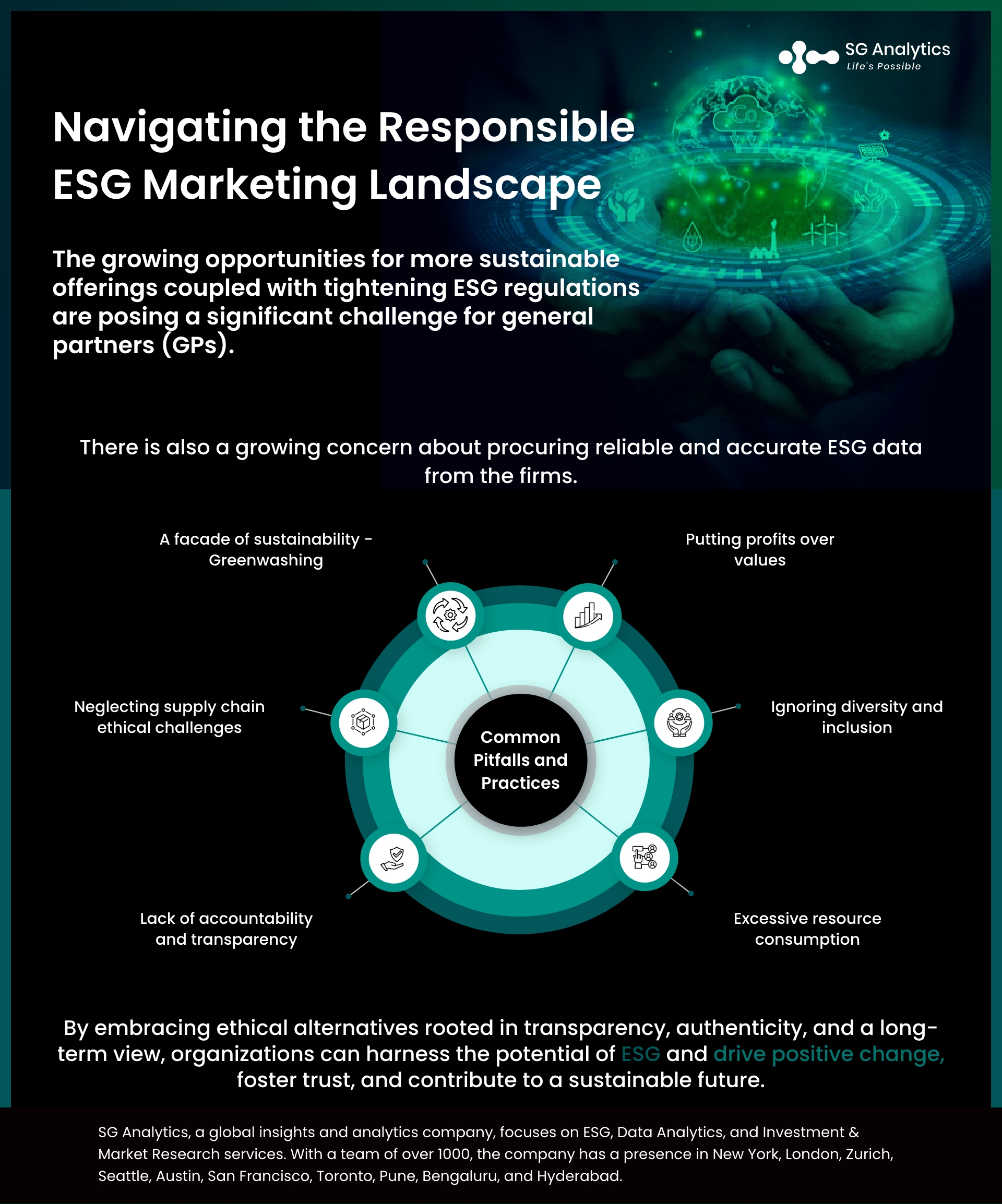In today's ever-evolving business landscape, embracing the principles of environmental, social, and governance (ESG) is not just a fleeting trend. Every business has its own reason for implementing ESG, such as public perception, risk mitigation, shareholder expectations, operational efficiency, or regulatory compliance.
While there are many recorded benefits of implementing ESG strategies, many organizations use their success and initiatives to generate positive marketing buzz around how they work toward a better future. Yet, despite best efforts, some inadvertently fall into the trap of unethical practices that sabotage the very essence of ESG.
ESG for Business: Market Competitiveness
The growing opportunities for more sustainable offerings coupled with tightening ESG regulations are posing a significant challenge for businesses as well as industry leaders. There is also a growing concern about procuring reliable and accurate ESG data from the firms.
Organizations are devising new strategies and employing sustainable frameworks to gather, communicate, and scrutinize this vital data throughout their ESG journey. They are also exploring the role of ESG in identifying potential threats and significant opportunities, from screening and due diligence to monitoring.
Read more: EU Sets a Global Benchmark with New “European Green Bond” Standards

By identifying and prioritizing ESG factors that are relevant to operations, industries, and stakeholders, enterprises are demonstrating a profound comprehension of strategic objectives while also showing their commitment to sustainable business practices. This approach enables them to align their actions with key ESG principles, thereby fostering long-term value creation and positive societal impact.
Common Pitfalls and Practices
While the ESG trend is understandably disconcerting, there is little evidence to suggest that the ESG backlash significantly undermines progress about corporate sustainability. In the journey toward integrating responsible ESG promotion, it has become vital for businesses to steer clear of the common ethical ESG pitfalls. While finding the right path can be complex and overwhelming, organizations can explore new opportunities and integrate critical frameworks that offer numerous benefits, ranging from generating ideas to identifying potential risks and keeping your company leadership accountable to achieving your ESG goals.
By embracing ethical alternatives rooted in transparency, authenticity, and a long-term view, organizations can harness the potential of ESG and drive positive change, foster trust, and contribute to a sustainable future.
Corporations face critical challenges across various ESG (environmental, social, and governance) topics, such as supply chains, data privacy, packaging, diversity and inclusion, workplace safety, and social justice. A lack of global agreement on standards across different areas of ESG further leaves corporate and industry leaders in a challenging position. Integrating appropriate regulation helps establish a level playing field, thereby ensuring that the set ESG objectives match the actions.
ESG is a critical consideration for businesses and investors as it presents risks and opportunities that would otherwise go unnoticed, especially over the long term. The growing urge to tackle the global economy and rapidly reduce greenhouse gas (GHG) emissions while adapting to a changing climate is collectively moving organizations toward these goals. This will ensure a livable world for future generations and a stable economy and financial system. Due to this reason, ESG remains a central and growing concern for companies and investors.
Read more: The Newest Competitive Edge: Fostering A Strong and Sustainable Company Culture
Some common pitfalls and practices that businesses should avoid to make genuine progress and not risk damaging their public image are as follows:

-
A Facade of Sustainability – Greenwashing
Greenwashing is emerging as an alarming trend across the business world. To gain a quick reputation boost, companies often make selective claims about their products or services to appear more environmentally or socially friendly. However, substantial changes are missing as they spend more time and money on marketing efforts than ESG. This can lead to short-term wins but erode the trust critical for long-term success. The path to genuine progress involves incorporating ESG principles into the very fabric of organizational operations. Authenticity is the key element to building a successful ESG culture.
-
Putting Profits Over Values
Organizations often fall into the trap of prioritizing ESG efforts for short-term financial gains. This shortsighted approach leads to neglecting the fundamental goal of ESG, fostering long-term sustainability and benefiting both the company and its stakeholders. When companies prioritize profits over purpose, they end up losing sight of the multifaceted benefits of ESG initiatives, thus ultimately undermining the essence of ESG. By finding the right balance between ESG and company profitability, organizations can take the high road that involves embracing a longer time horizon. To set achievable ESG goals, they need to align their goals with stakeholders' interests.
-
Neglecting Supply Chain Ethical Challenges
An organization's supply chain is the most vulnerable to ESG ethical challenges. Suppliers, contractors, and other partners are often exempted from ESG guidelines that a company has in place. However, ethical concerns can thrive where suppliers remain unchecked. This is often true across industries where cost is a significant factor. Instead of turning a blind eye, organizations need to incorporate a more ethical approach that involves cultivating responsible supply chain practices and a commitment to due diligence to drive positive change throughout the entire supply chain.
-
Ignoring Diversity and Inclusion
Diversity, equity, and inclusion (DEI) form the core principles of the ESG framework. Organizations that fail to prioritize diversity and inclusion suffer from a wide range of consequences, including stifling innovation, driving away new and valuable talent, and creating the risk of HR-related litigation. To attract as well as retain the best employees and suppliers, organizations need to find people from diverse and unique perspectives. Through diversity, they can build a culture that supports individuals.
Read more: Corporate Sustainability Reporting Directive

-
Lack of Accountability and Transparency
Governance is a critical part of ESG that demands companies to integrate systems and processes in place and ensure that the company's values and promises are being fulfilled. Ethical issues often arise from environmental concerns that have opaque governance structures. A lack of transparency can be a major concern for stakeholders seeking responsible leadership. Following a more ethical path involves creating a robust governance framework that supports transparency and accountability through a clear reporting framework and ethical conduct.
-
Excessive Resource Consumption
In pursuit of growth, often organizations fail to consider the environmental toll of their consumption. In addition to pollution and resource depletion, this approach leads to serious consequences from environmental activists' or eco-conscious consumers' perspectives. For this reason, it is vital to value resource efficiency and embrace the principles of a circular economy. This includes reducing waste, reusing materials, and embracing sustainable production methods to lower the ecological footprint and foster long-term sustainability.
Key Takeaways
-
There is growing pressure on companies to operate more sustainably. However, many existing ESG reporting frameworks are immature.
-
The pressure, opportunity, as well as rationalization, allow greenwashing to spread unchecked. But regulators need to impose measures to close it.
-
Business leaders need to focus on the "E," "S," and "G” in ESG equally to evolve as well as communicate with confidence by building long-term value.
-
Companies keen on publicizing their ESG ambitions are facing increasing scrutiny. Better governance measures can assist in avoiding the pitfalls.
Read more: iRecycle, iReduce, iRevolutionize: Apple Introduces their First Carbon Neutral Products

Final Thoughts
In the journey toward integrating responsible ESG promotion, it has become vital for businesses to steer clear of the common ethical ESG pitfalls. While finding the right path can be complex and overwhelming, organizations can explore new opportunities and integrate critical frameworks that offer numerous benefits, ranging from generating ideas to identifying potential risks and keeping your company leadership accountable to achieving your ESG goals.
By embracing ethical alternatives rooted in transparency, authenticity, and a long-term view, organizations can harness the potential of ESG and drive positive change, foster trust, and contribute to a sustainable future.
SG Analytics, recognized by the Financial Times as one of APAC's fastest-growing firms, is a prominent insights and analytics company specializing in data-centric research and contextual analytics. Operating globally across the US, UK, Poland, Switzerland, and India, we expertly guide data from inception to transform it into invaluable insights using our knowledge-driven ecosystem, results-focused solutions, and advanced technology platform. Our distinguished clientele, including Fortune 500 giants, attests to our mastery of harnessing data with purpose, merging content and context to overcome business challenges. Apart from being recognized by reputed firms such as Analytics India Magazine, Everest Group, and ISG, SG Analytics has been recently awarded as the top ESG consultancy of the year 2022 and Idea Awards 2023 by Entrepreneur India in the “Best Use of Data” category. With our Brand Promise of "Life's Possible," we consistently deliver enduring value, ensuring the utmost client delight.
A leader in ESG Services, SG Analytics offers bespoke sustainability consulting services and research support for informed decision-making. Contact us today if you are in search of an efficient ESG (Environmental, Social, and Governance) integration and management solution provider to boost your sustainable performance.
About SG Analytics
SG Analytics is an industry-leading global insights and analytics firm providing data-centric research and contextual analytics services to its clients, including Fortune 500 companies, across BFSI, Technology, Media & Entertainment, and Healthcare sectors. Established in 2007, SG Analytics is a Great Place to Work® (GPTW) certified company and has a team of over 1100 employees and has presence across the U.S.A, the U.K., Switzerland, Canada, and India.
Apart from being recognized by reputed firms such as Analytics India Magazine, Everest Group, and ISG, SG Analytics has been recently awarded as the top ESG consultancy of the year 2022 and Idea Awards 2023 by Entrepreneur India in the “Best Use of Data” category.

